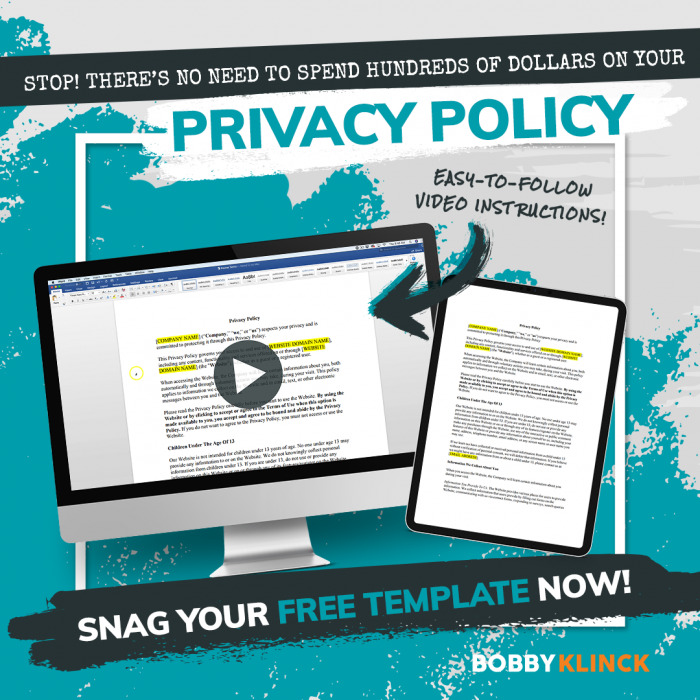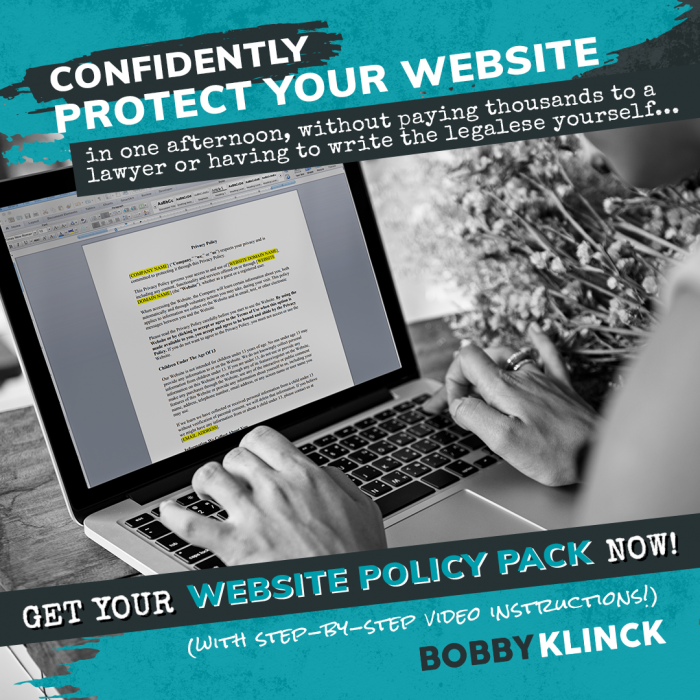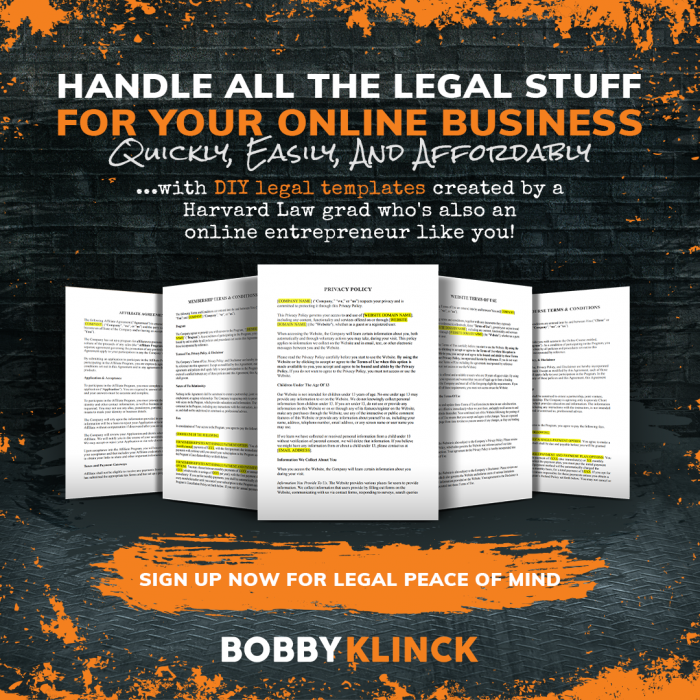5 Vital Action Steps to Legally Establish, Protect, and Operate Your Business
(Note: This popular article from my archives was updated April 2021).
Take this quick video quiz to find out whether you are taking the right steps to legally protect your business. Then read on for info about how to make things right.
I got a lot of pushback when I encouraged readers to protect their website with a Privacy Policy, Disclaimer, and Terms of Use.
Here are some of the emails I received:
- I have a small mailing list. Do I really need to pay attention to this stuff?
- I’m a local business owner. Do I really need this?
- I don’t make much money selling my services. Do I really need to worry about this?
The answers are yes, yes, and yes.
The “do I really need to” theme came through loud and clear.
That’s understandable, since most entrepreneurs have no idea what we really need to do to legally establish, protect, and operate our business.
- Maybe we try to take action, but the legalese is confusing, complex, and overwhelming.
- Maybe we figure that if we ignore the legal stuff, it’ll go away.
- Maybe we think of the legal part of our business as a one-time deal: set it and forget it.
That mindset can bite you in a vicious way (when a client refuses to pay or when a contractor shares confidential information or worst of all, when you get sued and lose the farm).
In reality, the legal stuff should be an integral, ongoing part of every business. It’s an investment – in terms of your time and money – that you absolutely must make if you’re serious about running a business.
So, how can we non-lawyer entrepreneurs implement appropriate legal protections (without going crazy and/or going into the poorhouse)?
Enter my new best friend, Bobby Klinck. (Ok, he’s not really my best friend… I’ve never met him in person. But we’ve emailed and Facebooked and video conferenced, so that counts, right?)
Bobby is a lawyer. A lawyer who speaks plain English. (Whaaat? Yes!)
He’s an intellectual property attorney who creates and sells easy-to-customize legal templates and forms for us to use in our business. And who explains exactly how to customize the forms in a way that makes sense to a non-legal mind.
Bobby does the hard work so we don’t have to. Frankly, I’d rather wire a few hundred smackers to him than hire a fancy-pants lawyer who bills me by the second and charges thousands of dollars for the same information and forms.
After purchasing Bobby’s website policy pack and experiencing just how easy they are to customize and add to my website, I began binge-listening to Bobby’s podcast.
The Certified Bada$$ Online Marketing Podcast
My favorite episodes to date are episode 34, Structuring Your Business, and episode 35, Naming Your Business. (Listen to or download episodes 34 and 35 below).
In these two episodes, Bobby does all the talking. In episode 34 he explains why you need to set up a corporate entity for your business, and he succinctly details the differences between a sole proprietorship, an LLC, an S Corporation and a C Corporation.
You may be yawning and thinking, “Ho-hum. That sounds boring!”
It’s not. I learned some juicy stuff (which I’ll share later in this article) that made me pat myself on the back for forming an LLC back in 2007!
In episode 35, Bobby outlines the steps you need to take before naming your business (or product, or event), and how to avoid trademark problems.
I also attended Bobby’s Legal Made Simple webinar, which was a mash-up of his podcast series.
Here are some of the key things I learned.
Organize and Structure Your Business
If you don’t set up an LLC (Limited Liability Company), and something goes wrong (such as you getting sued), you are personally liable. The entity suing you can come after your personal assets (home, car, bank account). When you create an LLC, it separates the liabilities between your business and yourself.
You’re going to build your future through your business, so setting up a legal structure is an investment worth making.
Keep the Money Separate
When you create your LLC, you’ll need a separate business bank account.
Do NOT pay your personal expenses out of your business account! If you do, you’ll lose the protection you get from having an LLC.
You will purchase your LLC license from your state (file online through your Secretary of State’s website). You’ll also want an LLC Operating Agreement, which defines how your company will operate. Most banks require an operating agreement in order to open your business account.
Click here to get Bobby’s template for an *LLC Operating Agreement
Use Written Agreements
“…But my business partner is my best friend!”
“…But my client is my sister-in-law!”
All the more reason to get a written agreement. You want to protect those important relationships and avoid hurt feelings, back-stabbing, fistfights, and legal threats.
4 Types of Written Agreements You Need
1. Client Agreement
I use a client agreement (aka, contract or services agreement) with every client and for every project. An agreement specifies, among other things, what you’ll do (and not do), as well as when and how the client will pay.
Click here to get Bobby’s Client Agreement Template
2. Course and Membership Agreements
When you offer an online course or membership program, the agreement details the terms and conditions, payment plan, refund policy, copyright infringement, etc. Before someone is allowed to buy your program, they must click a button that says they accept the terms.
Click here to get Bobby’s Course Agreement
Click here to get Bobby’s Membership Agreement
3. Confidentiality Agreement
Most of us collect more confidential info than we realize – our email list and info about our clients are two biggies.
Many of us also invent or develop proprietary systems, and we need to protect the ways people can use those systems.
Before you share confidential business information with anyone, you need an agreement in place.
Click here to get Bobby’s Confidentiality Agreement Template
4. Independent Contractor Agreement
This one goes hand-in-hand with the Confidentiality Agreement. When you hire a contractor such as a virtual assistant, content writer, graphic designer, or programmer, the contractor agreement outlines the scope of work, fees, and payment. It also specifies that the deliverables your contractor creates are owned by your company.
Click here to get Bobby’s Independent Contractor Agreement
If you have employees (instead of or in addition to contractors), you’ll want Bobby’s Employee Agreement Pack.
Add Legal Policies to Your Website
In my article, “I Discovered an Awesome GDPR-Compliant Privacy Policy,” I noted the three legal policies that should go on every website:
Terms of Use
Ground rules for your website; where you tell visitors what’s allowed and what’s not.
Disclaimer
Where you tell visitors that you are not giving them professional “advice,” but rather, educational information. Your disclaimer also discloses information about affiliates and related topics, and is where you disclaim liability for certain events.
Privacy Policy
 Where you tell website visitors what info you collect, how you use it, and how you protect it.
Where you tell website visitors what info you collect, how you use it, and how you protect it.
IMPORTANT: If you collect any information from anyone, a privacy policy is not optional. You legally MUST have it!
Bobby offers the Privacy Policy for FREE. It is exactly the same policy that you get when purchasing the Website Legal Policy Pack.
Click here to buy all three, easy-to-customize website policy pack
Want ALL the Policies?
Visit Bobby’s Template Library to view all the current templates listed in this article (plus a few more).
Naming Your Business
Before you launch your business, you’ll want to come up with a good name that no one else is using.
If you don’t do your homework in this area, you may have to change your business name. And that’s a pain!
So take the three action steps I’ll outline below as early as possible in your business development process.
Bobby says:
“Trademark law is all about branding. The first person who uses a name for commercial purposes has the exclusive right to use that name.”
If you use your own name for your business, trademark infringement usually isn’t an issue. But if you decide to name your business “Disney” or “Apple,” you’re setting yourself up for a lifetime of lawsuits.
I advise my entrepreneurial clients to take the same three steps that Bobby outlines in his podcast:
1. Do a Google search to see if anyone else is using the name you want. Look at several pages of search results. If someone is using your name, click to their website to see what it’s all about.
- If you name your biz (and website) something similar to theirs, will people get confused and go to their site instead of yours?
- Does this person/business sell or promote something unsavory that you don’t want to be associated with?
2. Do a namecheckr or namevine search to quickly see whether the brand name you want is available.
- Is the domain (website address) available?
- How about the usernames for Facebook, Instagram, Pinterest, YouTube, Twitter, and other social channels you plan to use?
You want to own your brand, and that means registering the same username (the one that matches your domain and business name) everywhere possible.
You don’t have to be active on every social network, but you should reserve your branded username on any social media that you may possibly use during the life of your business.
3. Do a trademark search to learn whether the name you want has a registered trademark (if it does, you can’t use it).
To run a trademark search (if you’re starting a US-based business):
- Go to the United States Patent and Trademark Office (USPTO) website.
- Click the “Trademarks” tab at the top of the page.
- Find the module that says, “Search trademark database” and click “Search TESS.”
- Put in the brand name you want to search for. Also search for closely-related names and common misspellings of your desired business name.
If you find a trademarked name that is in your same area of commerce or is similar to the name you want, it’s best to choose a different name.
Pay Close Attention to Copyright Law
Copyright is a topic my readers ask me about all the time.
Q1: When I publish a blog post, do I have to put a copyright notice at the end?
No. Copyright protection is automatic, and goes into effect the second you finish creating your content. You don’t have to register a copyright (it’s not the same as registering a trademark, which I explained in the previous section).
Copyright protection simply gives the person who creates the content the exclusive right to use it.
Q2: Can I play my favorite song that I downloaded from iTunes in the background of my Facebook Live or as the intro to my podcast?
No. That music is copyrighted by the artist. You must purchase royalty-free intro-outro music. Or write and record your own music!
Q3: Can I do a Google image search and use any image I find there on my website, blog, or in a social media post?
NO! And again I say, NO!
Those images are almost always copyrighted. Similar to music, you must obtain a royalty-free image, and follow the licensing rules for each image you download.
There are loads of great places online to find free and low-cost royalty free photos. Check out my article, “25 Terrific Places to Find Free and Low-Cost Stock Photos Online.”
Your Turn!
While I have most of the necessary legal pieces in place, I’ve been lackadaisical about the Confidentiality Agreement and the Independent Contractor Agreement. I plan to take action in both those areas.
How about you? What is ONE area you will commit to working on?
Don’t feel as if you have to do it all at once. Choose one thing that will most benefit your business. Then do it. Please share what you’re going to take action on in the comments so we can encourage each other.
*Note: This article includes affiliate links to products sold by Bobby Klinck. When you purchase products using my link, I receive a commission. I am an affiliate for select products I have purchased and use myself, and I highly recommend Bobby’s templates and forms!




This is SO helpful. Just what I was searching for.